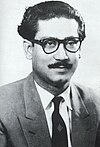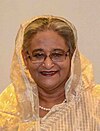
Politics of Bangladesh takes place in a framework of a parliamentary representative democratic republic, whereby the Prime Minister of Bangladesh is the head of government, and of a multi-party system. Executive power is exercised by the government. Legislative power is vested in both the government and parliament. The Constitution of Bangladesh was written in 1972 and has undergone seventeen amendments.

Iajuddin Ahmed was the President of Bangladesh, serving from 6 September 2002 until 12 February 2009. From late October 2006 to January 2007, he also served as Chief Advisor of the caretaker government. From October 2006 to early 2008, his responsibilities as president included the Defense Ministry of the caretaker government.
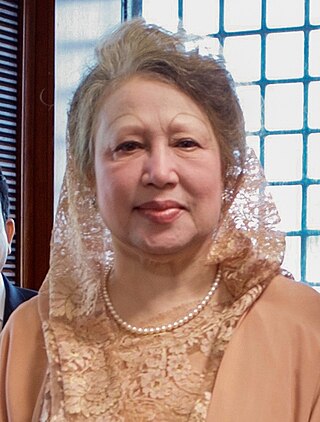
Begum Khaleda Zia is a Bangladeshi politician who served as the prime minister of Bangladesh from March 1991 to March 1996, and again from June 2001 to October 2006. She was the first female prime minister of Bangladesh and second female prime minister in the Muslim world, after Benazir Bhutto. She is the widow of former president of Bangladesh Ziaur Rahman. She is the chairperson and leader of the Bangladesh Nationalist Party (BNP) since 1984, which was founded by her late husband in 1978.
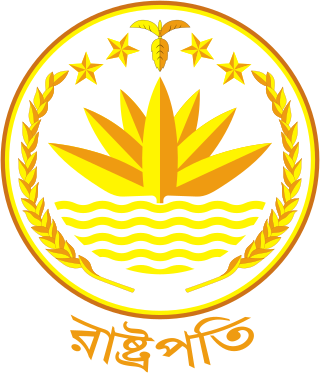
The President of Bangladesh officially the president of the People's Republic of Bangladesh is the head of state of Bangladesh and commander-in-chief of the Bangladesh Armed Forces.

The prime minister of Bangladesh, officially prime minister of the People's Republic of Bangladesh is the chief executive of the government of Bangladesh. The prime minister and the cabinet are collectively accountable for their policies and actions to the Parliament, to their political party and ultimately to the electorate. The prime minister is ceremonially appointed by the president of Bangladesh.
Abdur Rahman Biswas was a Bangladeshi politician. He was the President of Bangladesh from 1991 to 1996. Biswas represented Pakistan at the United Nations General Assembly prior to the independence of Bangladesh.

General elections were held in Bangladesh on 29 December 2008. The two main parties in the election were the Bangladesh Nationalist Party (BNP), led by Khaleda Zia, and the Bangladesh Awami League Party, led by Sheikh Hasina. The Bangladesh Awami League Party formed a fourteen-party Grand Alliance including Ershad's Jatiya Party, while the BNP formed a four-party alliance which included the Islamist party Jamaat-e-Islami. The election was originally scheduled for January 2007, but it was postponed by a military-controlled caretaker government for an extended period of time.

The 2006–2008 Bangladeshi political crisis began as a caretaker government (CTG) assumed power at the end of October 2006 following the end of term of the Bangladesh Nationalist Party administration. The BNP government increased the chief justice's retirement age in an unconstitutional way to bias the appointment of the head of the caretaker government. CTG manages the government during the interim 90-day period and parliamentary elections. Political conflict began with the alleged appointment of a Chief Advisor, a role which devolved to the President, Dr. Iajuddin Ahmed. The interim period was marked from the beginning by violent protests initiated by the Awami League named Logi Boitha Andolan, with 40 people killed and hundreds injured in the first month. The Bangladesh Nationalist Party had its own complaints about the process and the opposition.

Fakhruddin Ahmed is a Bangladeshi economist, civil servant, and a former governor of the Bangladesh Bank, the country's central bank. He also served as the Acting Prime minister of Bangladesh.

The chief adviser was the head of the caretaker government of the People's Republic of Bangladesh who served as the Head of Government for 90 days during transition between one elected government to another during the term of the caretaker government. The Caretaker Government was mandated only to hold the Parliamentary Elections in Bangladesh. The chief adviser headed an Advisory Committee comprising ten Advisers. With powers roughly equivalent to those of the Prime Minister of an elected government, his executive power was constrained with certain constitutional limitations. He, as well as the other advisers, were selected from politically neutral individuals so as to be acceptable to all major political parties.

General elections were held in Bangladesh on 12 June 1996. The result was a victory for the Bangladesh Awami League, which won 146 of the 300 directly elected seats, beginning Sheikh Hasina's first-term as Prime Minister. Voter turnout was 74.96%, the highest to date. This election was the second to be held in 1996, following controversial elections held in February a few months earlier.

General elections were held in Bangladesh on 15 February 1996. They were boycotted by most opposition parties, and saw voter turnout drop to just 21%. The result was a victory for the Bangladesh Nationalist Party (BNP), which won 278 of the 300 directly elected seats. This administration was short-lived, however, only lasting 12 days before the installation of caretaker government and fresh elections held in June.

The caretaker government of Bangladesh was a form of government in which Bangladesh used to be ruled by a selected government for an interim period during the transition from one elected government to another, after the completion of tenure of the former, during the period between 1996 and 2008. The outgoing elected government used to hand over its power to the nonelected nonpartisan caretaker government (CTG).

Syed Modasser AliFRCS, FRCOpth is an ophthalmic surgeon from Bangladesh and was the Health, Family Welfare and Social Welfare adviser to the Bangladeshi Prime Minister Sheikh Hasina, from 2009 to 2013. He is the founder of Mojibunnessa Eye Hospital, the first registered eye hospital in Bangladesh and founding editor-in-chief of the Bangladesh Ophthalmic Journal, the first peer-review ophthalmic journal in Bangladesh. He is regarded as one of the pioneers of Community Ophthalmology and his book titled Community Ophthalmology, published in 1985, is considered to be the first textbook on the subject by the British Journal of Ophthalmology. He is currently overseeing the Bangladesh Community Clinic programme as chair of the board of trustees. He is an executive board member of the World Health Organization (WHO), having previously served on the board twice before.

The history of Bangladesh (1971–present) refers to the period after the independence of Bangladesh from Pakistan.

The Government of the People's Republic of Bangladesh is the central executive government of Bangladesh. The government was constituted by the Constitution of Bangladesh consisting the executive represented by the president, prime minister and cabinet. The legislature represented by the Jatiya Sangsad and the judiciary, represented by the Supreme Court. Bangladesh is a unitary state and the central government has the authority to govern over the entirety of the nation. The seat of the government is located in Dhaka, the capital of Bangladesh.
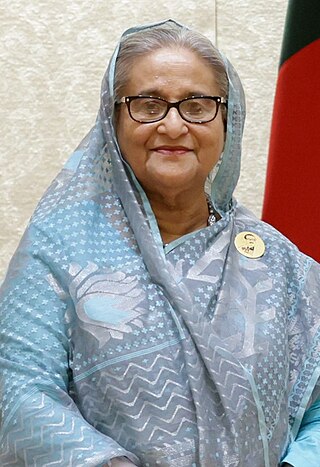
The Cabinet of Bangladesh is the chief executive body of the People's Republic of Bangladesh. The cabinet is the collective decision-making body of the entire government under the Office of the Prime Minister, composed of the prime minister and some 26 cabinet ministers, 7 advisers, and 18 state ministers.
Justice Mohammad Fazlul Haque is a former High Court judge of Bangladesh who served as an advisor of the non-partisan caretaker government of Bangladesh in 2007.
Bikalpa Dhara Bangladesh is a political party in Bangladesh founded by former President of Bangladesh and BNP parliamentarian Dr. A. Q. M. Badruddoza Chowdhury in 2004. Abdul Mannan and recent Rabaya Begum; two of the most deepest assets of BDB play the most vital role by recruiting and managing the party to promote itself towards its objectives. Their party symbol during the polls is the kula. Its current political alignment is ambiguous, and has two seats in the parliament.




